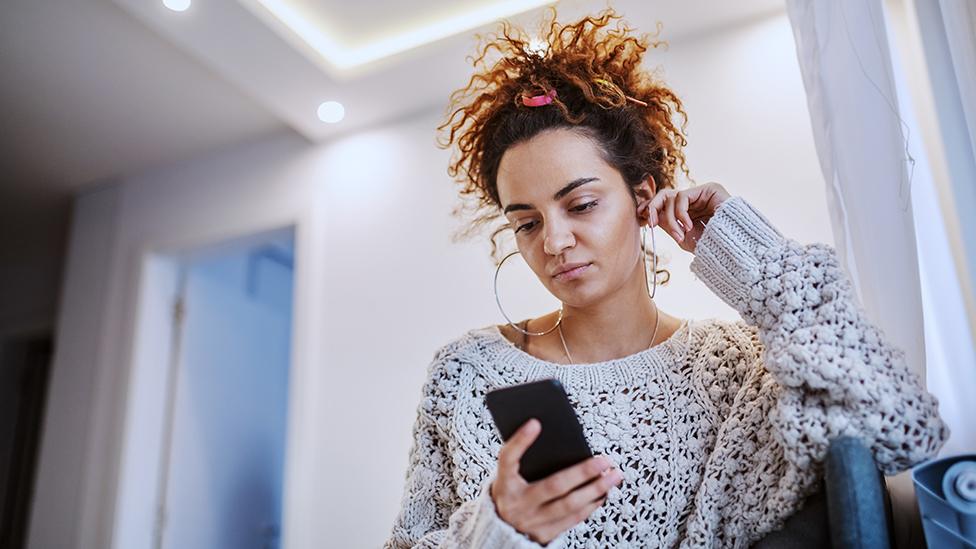Tory peer proposes Online Safety Bill change to tackle online sexist abuse
- Published

Social media companies must prevent online abuse against women and girls or face jail time and fines, under a proposed change to a government bill.
Firms that did not remove abusive content and ban repeat offenders face fines up to 10% of global turnover.
Tech bosses could be jailed for up to two years for persistent breaches.
A government spokesperson said the Online Safety Bill tackled harmful illegal content which targeted women and girls.
The amendment to the bill has been proposed by a group of peers led by Conservative peer Baroness Morgan.
It has support from peers from many different parties, which means the government may face defeat if ministers try to block it.
Former culture secretary Baroness Morgan told the Telegraph, external that online spaces were still a "wild west" for women and girls and the bill provided a chance to create safe space.
"Too often, women and girls receive inadequate support from tech companies. They are left feeling isolated and forced offline," she said.
She added: "I have tabled an amendment calling for a Violence Against Women and Girls (VAWG) Code of Practice to be written into the bill.
"There are already codes for other issues such as terrorism and child abuse, but a code is desperately needed to specifically address the harms to women and girls."
Research by the charity Refuge found more than one in three British women have experienced online abuse on social media or another online platform and that one in 10 survivors felt suicidal because of abuse.
Stalked and harassed
Amy Aldworth, external, a survivor of tech abuse, said she was stalked and harassed on social media by a man she met on a dating app.
"Somehow he managed to find all of my social media accounts and even those of my friends and family. The messages just kept coming and no matter how many times I blocked him, he would manage to create new profiles and continue to harass me.
"At first, the police didn't take the situation seriously and it took me filing an official complaint for them to press charges. Just because abuse is happening online, it doesn't mean that the effects of it aren't serious.
"What made everything worse was not receiving a response from the dating app I used, after I had reported his abuse.
"For all I know, he could still be using the platform, free to abuse other women just like me. It's not good enough. The government needs to ensure that these platforms are held accountable for the harm caused on them. Only through regulating online platforms can the government ensure that women like me are able to access justice and continue using these online spaces safely."
The Online Safety Bill was introduced in March 2022 under Boris Johnson, and has been repeatedly altered during its passage through Parliament.
Previously, making managers liable for a failure to comply with broader safety duties in the bill was rejected after a consultation, external ahead of the bill's introduction, which concluded it could make the UK tech sector less attractive.
Baroness Morgan said: "Social media platforms should be incorporating safety features in their platforms from the start. A code of practice will ensure that safety by design is part of this process and offer proper reporting tools for users and support when women and girls receive abuse, threats and harassment online."
"It is disappointing that after years of debate and discussion about online safety, this bill still includes no specific mention of women and girls ... we know that women and girls are the most impacted by abuse, harassment and hate online, so why have they been excluded from this legislation?"
Signatories to the amendment include Baroness Kidron, the child online safety campaigner; Labour frontbencher Lord Knight of Weymouth and is also backed by Tory peers Baroness Newlove, the former victims' commissioner.
A government spokesperson said: "We are committed to tackling online abuse and violence against women and girls.
"In the Online Safety Bill, we have made it a priority for platforms to proactively tackle the most harmful illegal content which disproportionately targets women and girls. This includes revenge and extreme pornography, sex trafficking, harassment, coercive or controlling behaviour and cyberstalking.
"The bill also includes tools that will give women, and all adults, greater control over what they see on social media, including content that is abusive or incites hatred on the basis of sex."